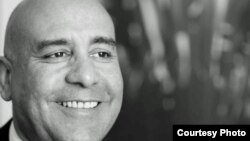Later this year, Tunisia holds elections which will be closely watched around the world. The North African country's 2011 revolution helped inspire the larger Arab uprisings. Today many hope it will also spread the seeds for Arab democracies.
One man will not be running in the polls but what he says gets plenty of attention. Businessman and philanthropist Lotfi Maktouf and his prescriptions for "Saving Tunisia."
It's been a year since Lotfi Maktouf published Sauver la Tunisie, or Save Tunisia, but the headline-grabbing book - and its author - are still in the news. An international businessman based in Monaco, Maktouf seems a long way from his homeland. But his assessment of post-revolution Tunisia - what's gone wrong and what's needed for it to go right - has resonated in the North African country and abroad.
"Let me put it this way. I'm optimistic for my country for the medium-to-long term. I'm not clear about what's cooking these days. I don't know [if] the technocratic government is doing anything…the curse for this transition government is that it didn't do [much for] the long term, but it didn't do [much for] the short term," said Maktouf.
Maktouf's largely critical assessment of Tunisia's interim government is only one part of what he addresses. The book examines the legacy of post-independence president Habib Bourguiba and dictator Zine el-Abidine Ben Ali, who was toppled in a January revolution three years ago.
He's no fan of the Islamist Ennahda party that has dominated post-revolutionary politics - and, he believes, has nothing to do with Tunisia's cultural fabric. He thinks no party has an economic blueprint for getting Tunisia back on its feet. And just a few months before his country holds legislative and presidential elections, Maktouf is staying carefully apolitical.
"I'm not interested in backing anyone, of course. They all kept hitting on us - Ennahda, Nidaa Tounis [a secular party]… I met all these leaders because they solicited me to be part of the government, they offered me the position of governor of the central bank and later the position of minister of finance," he said. "I nicely declined and said, 'you know, my focus is somewhere else.'"
Maktouf's focus is on his Almadanya foundation, which he started shortly after Tunisia's revolution. But not before he made a reconnaissance visit to a country he left more than 35 years ago.
"I travelled there, four days a week, for four months, all over the country….I visited everywhere, especially areas which were totally forgotten by the old regime..and I listened. And I learned so much about this beautiful country and I learned what being a Tunisian meant," said Maktouf.
Almadanya focuses on Tunisia's environment, culture, and especially on education. That was Maktouf's own ticket out of a poor home in the coastal town of Sousse. He earned law degrees at the Sorbonne in France and Harvard in the United States. He worked on Wall Street and for the International Monetary Fund before returning to Europe.
"I'm a firm believer in the American dream idea - I've lived it. I come from a very poor background; I ended up at Harvard. I don't want to brag about myself…there are many other people who did even better than me. All I'm saying is that it's possible. How is it possible? Hard work," he said.
Along with Tunisians, Maktouf is sharing that message with immigrant kids in France's working class suburbs, where he is invited to participate in seminars. He's also started working on another book - drawing lessons about the wider Arab uprising. He believes democracy starts at the grassroots. And, he hopes, it will take hold in Tunisia.










